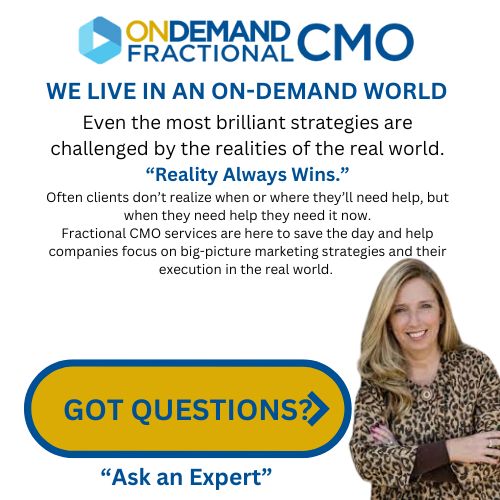
The cost of hiring a fractional Chief Marketing Officer (CMO) can vary widely depending on several factors, such as the size of your company, the industry you’re in, the experience level of the CMO, and the specific demands of the role. Here are some general guidelines:
- Hourly or Day Rates: Fractional CMOs often charge on an hourly or day-rate basis. Rates can range from $200 to $1500 per hour, or even higher for highly experienced CMOs.
- Monthly Retainer: Some fractional CMOs may work on a monthly retainer basis, which could range from $5,000 to $30,000 per month or more, depending on the scope of work and the size of the business. (Many come with their own teams, technologies, Contacts and opportunities)
- Project-Based Fees: For specific projects, a fractional CMO might charge a flat fee. This can vary greatly depending on the complexity and duration of the project but typically, you will get more from a fractional CMO who has their own team and success than you will from a single in-house team member ESPECIALLY if you include soft costs like rent and computers, as well as benefits, management and related employee expenses!
- Experience and Expertise: The cost can also be influenced by the CMO’s level of experience and expertise, particularly if they have a proven track record of success in your industry.
- Scope of Work: The broader the scope of work (e.g., strategic planning, team leadership, execution of marketing campaigns), the higher the cost is likely to be.
- Company Size and Needs: Larger companies or those with more complex marketing needs may require a more experienced CMO and thus incur higher costs.
- Geographical Location: Location can influence rates, with CMOs in major metropolitan areas often charging more than those in smaller cities or rural areas. (MOST CMOs require the company to pay travel, expenses and related costs associated with the project) some however charge a higher retainer and handle that expense, so make sure you know your options and budget accordingly.
- Market Demand: The demand for CMO services in your specific market can also affect the cost.
It’s important to clearly define the scope of work and expectations when engaging a fractional CMO to ensure that you get the best value for your investment. Remember to compare the cost against the potential value and return on investment that a skilled marketing executive could bring to your business.
PROJECT or SCOPE BLEED & FRUSTRATION
Setting the groundwork, expectations, and goals upfront with a fractional Chief Marketing Officer (CMO) is crucial for several reasons, particularly to minimize project or scope bleed and frustration. Here are the key reasons, along with examples:
- Clear Scope of Work: Establishing a clear scope of work ensures that both parties understand what is expected. This minimizes the risk of scope creep, where additional tasks are added gradually without proper planning or budget adjustments.
- Example: If a company hires a fractional CMO to develop a marketing strategy but does not specify the scope, the CMO might end up handling operational tasks like managing social media accounts, which were not part of the initial agreement. This leads to additional work without clear boundaries or compensation.
- Defined Goals and Objectives: Clear goals and objectives help in aligning the CMO’s efforts with the company’s overall strategy and desired outcomes. This prevents misaligned efforts and ensures that the CMO’s work directly contributes to the company’s success.
- Example: A business aiming to increase its online presence needs to communicate this goal to the fractional CMO. Without this clarity, the CMO might focus more on traditional marketing methods, leading to suboptimal use of resources and time.
- Budget Management: Clear communication about the budget upfront helps in managing financial resources effectively and prevents unexpected expenses.
- Example: A fractional CMO working without a defined budget may invest in high-cost marketing channels, causing financial strain on the company. Setting a budget at the outset would guide the CMO to choose more cost-effective strategies.
- Timeframe and Deadlines: Setting clear timeframes and deadlines ensures that marketing initiatives are aligned with business timelines, such as product launches or seasonal peaks.
- Example: If a company plans to launch a new product in six months, the fractional CMO needs to know this deadline to align the marketing strategy accordingly. Without this information, marketing efforts might not be synchronized with the product launch.
- Performance Metrics: Establishing performance metrics upfront allows for the measurement of the CMO’s impact and ensures accountability.
- Example: If the goal is to increase website traffic by 30% within a quarter, this metric should be communicated to the fractional CMO. Without such specific metrics, assessing the CMO’s performance becomes subjective and potentially contentious.
CMO CONSULTING COMPANIES AND FIRMS
Creating a checklist in a table format can be an efficient way to organize and track the important aspects of hiring a CMO for consulting companies and firms. Here’s a structured checklist:
Checklist Item Description/Details Notes/Comments Define Business Needs Identify specific marketing goals, challenges, and the role a CMO will play in addressing these. Tailor this to the unique needs and scale of your business. Establish Budget Determine the budget for the CMO role, including salary, bonuses, and other compensation. Ensure it aligns with industry standards and company capabilities. Create a Job Description Draft a detailed job description including responsibilities, qualifications, experience level, and expectations. Make it clear and comprehensive to attract suitable candidates. Search for Candidates Utilize various channels like LinkedIn, industry events, and recruitment agencies to find candidates. Look for candidates with relevant experience in similar industries. Review Backgrounds Check candidates’ educational qualifications, work history, and track record in marketing leadership roles. Focus on relevant experience and proven success in similar roles. Conduct Interviews Schedule and conduct thorough interviews with potential candidates. Include scenario-based questions to gauge practical skills. Assess Skills and Fit Evaluate candidates’ strategic thinking, leadership, and cultural fit with your company. Consider personality tests or work simulations if applicable. Check References Contact former employers or clients to verify candidates’ experiences and performance. Focus on feedback related to leadership and marketing success. Negotiate Terms Discuss and finalize the terms of employment including salary, benefits, and work arrangements. Ensure both parties are clear and agreeable to the terms. Onboarding Plan Develop an onboarding plan to integrate the CMO into the company effectively. Include introductions to key team members and training on systems. Set Performance Metrics Agree on performance indicators to evaluate the CMO’s impact on business goals. Ensure these are realistic, measurable, and aligned with business objectives. Regular Review Meetings Plan for regular check-ins and review meetings to assess progress and address any concerns. Helps in maintaining alignment and adjusting strategies as necessary. This checklist provides a structured approach to hiring a CMO for consulting companies and firms, ensuring all critical aspects are considered and addressed throughout the hiring process.






